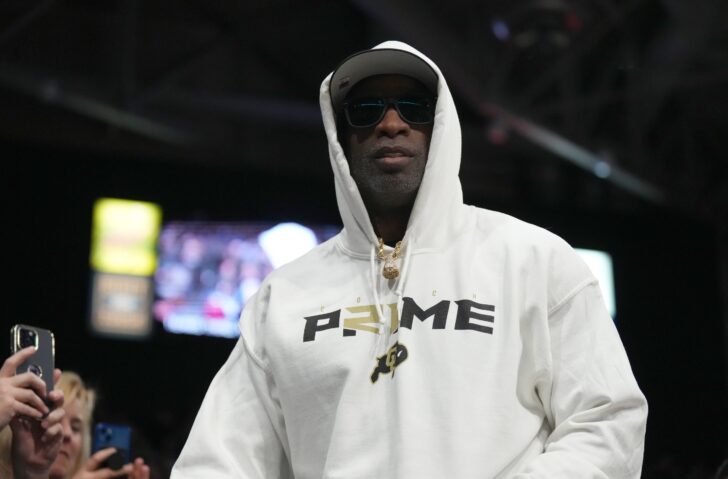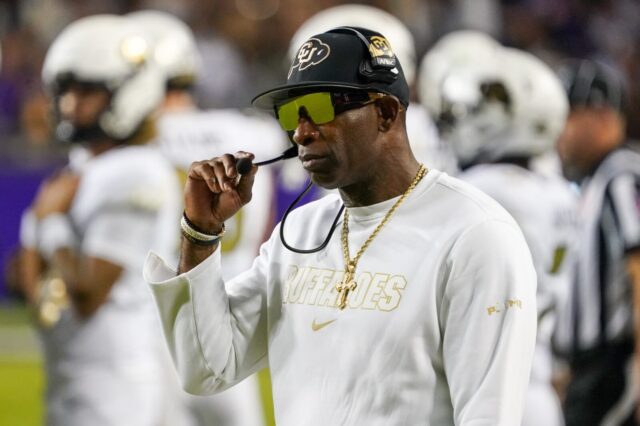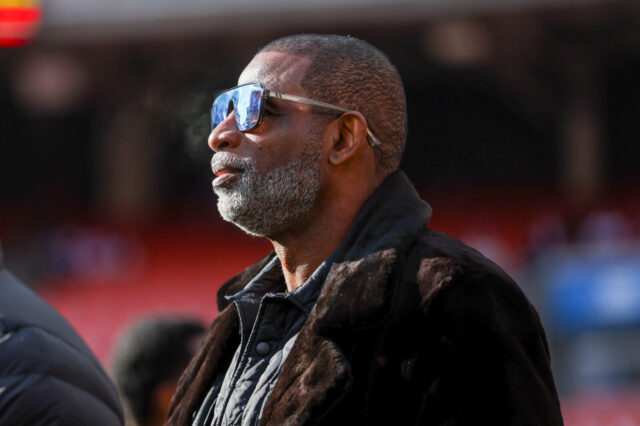Deion Sanders. Neon Deion. Prime Time. Prime.
As a Black, millennial, Colorado native, I’ve always viewed Deion Sanders as a culture unto himself. On the heels of a recent Celebration Bowl loss, Deion Sanders is headed back to Boulder to help revitalize a bottom-of-the-basement Colorado football program that hasn’t been relevant since Chris Brown, Bobby Purify and Jeremy Bloom anchored a miracle 62-36 victory over the Nebraska Cornhuskers in 2001. With Deion comes his son – and first-round NFL Draft hopeful – Shedeur, who instantly becomes one of the most talented quarterback prospects in Colorado football history.
Since moving to the Pac-12, the Colorado Buffaloes have been one of the worst football teams at the FBS level, but that reality is soon to change with the emergence of Deion Sanders as the ‘Face of the Program’.
Colorado is set to see an influx of talent, skill and personality that it may not have ever seen before, and much of this is due to the fact that Deion Sanders is already one of the most formidable recruiters and motivators in college football. Boulder has welcomed Deion and his family with open arms since the news of Coach Deion’s departure from Jackson State University to Colorado first broke publicly, after the institution pried Coach Sanders away from JSU with a five-year, $29.5 million deal (with bonuses included) that becomes the largest contract for a head coach in CU’s history. This deal also makes Coach Deion one of the ten highest-paid coaches in college football.
Deion Sanders is one of the most unique personalities in sports, and he is, objectively, one of the most culturally unique personalities in the history of sports, as well. There are few human beings whose personality has been more integral to their personal and team success than ‘Prime Time’. His swagger, confidence and ‘drip’ have made him an unmistakably large figure in the football universe, and it was this notoriety that helped him to lead Jackson State University to three years of success.
One of the benefits of Sanders taking his first coaching job at a Historically Black College and University (HBCU) is that he was able to connect recruits to more than just football. He connected them to an identity and a culture. Black athletes make up a large portion of college football rosters and many feel as if they lose a part of their culture when they attend ‘Predominantly White Institutions’ (PWIs). If a person from outside of the Black community hears this, then it may come as a surprise to think that Black athletes in the most popular and lucrative collegiate sport would feel this way, but this has been true for decades. Sanders himself experienced this when he attended Florida State University as one of the best athletes of his era.
The benefit of Boulder now having access to Deion is that he gives the institution more credibility than it would have had on its own. When Deion recruits a potential student-athlete (in particular a Black student athlete), he is able to open doors with these kids in ways that no one else simply can. Travis Hunter, the No. 1 recruit in the nation at the time, is a prime example of how Deion is able to create credibility for an institution that wouldn’t have had it without him. Both high school and college students alike will be flocking to earn an audience with Coach Sanders and his staff, so they can prove they are ready to assist in the University of Colorado’s rebirth onto the national scene.
Boulder will benefit greatly from Deion’s presence; not just because of the caliber of coach and recruiter that he is, but because of the cultural credibility he has among so many young people. He’s a Super Bowl Champion, an NFL Hall-of-Famer and he’s often regarded as the greatest cornerback to ever touch a blade of grass. Boulder will be better, quite simply due to Deion Sanders’ gravity.
The real question is, ‘Is Boulder ready for Deion, and how he will impact its campus?’ A Black head coach, with a Black wife, Black children and seeped in Black culture is nothing to sneeze at when talking about an institution that has had it’s own issues of protection and affirmation of the Black experience. In all of the best ways, Deion, Shedeur and the Sanders family may be the best thing to happen to Boulder, but it may also be the most challenging as well.
Will Deion be able to be himself, even if the success is slow to follow? If Deion, or his players, speak out in a way that makes some uncomfortable, will he still be unilaterally accepted? If his choice in music is not a reflection of the ‘greater Boulder culture,’ will this become problematic? All of these are questions that will get asked and answered about ‘Coach Prime’s’ reign in the near future.
These are some of the questions that Sanders and his family may have asked to themselves as they explored leaving their HBCU to move to Boulder. Like many Black and Brown Americans, there are the questions we all ask ourselves when considering taking jobs in areas that do not have a high population of people who identify as a Black or Brown person. There is a level of safety that a person can feel when they are surrounded by people who look like them, and it can be a challenge to leave that place of proximity out of fear or concern. Obviously, this was not a deterrent for Deion, and I’d argue it was seen as a challenge to help rebuild the team in light of this new reality.
If you’ve kept up with Twitter, then you can see that many Black people have felt that Deion is ‘betraying his people’ by leaving an HBCU to coach at another institution despite so much good that he has done at Jackson State University. But these are the kind of experiences that are unique to Black coaches and athletes in college football.
In my humble opinion, I expect a tremendous amount of success from the University of Colorado – on and off the field. I expect, because of Deion’s ability as a coach and recruiter, there is going to be an influx of talent, fighting spirit and winning that CU has not seen in two decades. I expect Shedeur Sanders to push his name into the Heisman conversation as he takes on the likes of USC, Utah, Washington and Arizona on national television next season.
Time will tell. But what I do know is that Deion Sanders is not just a win for Colorado football.
He is a win for the culture.
SwipaCam is a Denver Sports Analyst, YouTuber and popular figure across social media discussing the NBA, NFL and Culture. He is a published author and is an advocate for Justice, Inclusion and Equity. He is a graduate of Northern Colorado and Baylor University currently residing in Atlanta, Georgia.



